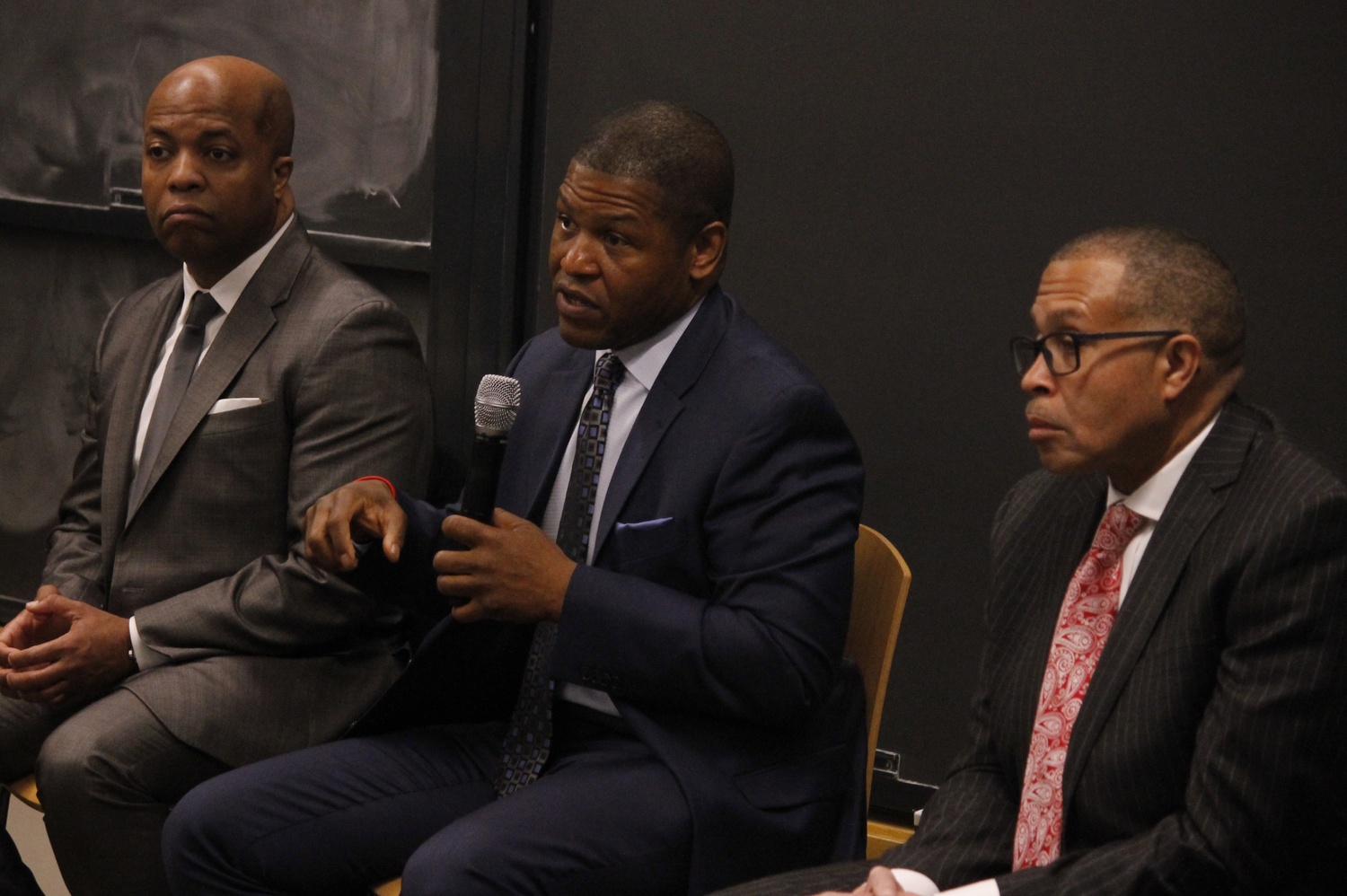
News
Cambridge Residents Slam Council Proposal to Delay Bike Lane Construction

News
‘Gender-Affirming Slay Fest’: Harvard College QSA Hosts Annual Queer Prom

News
‘Not Being Nerds’: Harvard Students Dance to Tinashe at Yardfest

News
Wrongful Death Trial Against CAMHS Employee Over 2015 Student Suicide To Begin Tuesday

News
Cornel West, Harvard Affiliates Call for University to Divest from ‘Israeli Apartheid’ at Rally
At Kennedy School, Police Chiefs Discuss Use of Force, Harvard Student’s Arrest

Almost a week after the arrest of a Harvard student led to allegations of police brutality, three police chiefs from Detroit, San Francisco, and Minneapolis visited the Harvard Kennedy School Thursday to field questions about the realities of modern-day policing.
Professor Robert W. Livingston, a lecturer of public policy at the Kennedy School, moderated the event, which was planned before the arrest occurred. The police chiefs also visited Livingston’s classroom and attended a dinner with students while on campus.
Livingston opened the event by informing students, faculty, and staff present that the chiefs had already seen video footage, released by the New York Times, capturing the arrest of a naked and unarmed black College student Friday by at least three Cambridge Police Officers and one Transit Police Department officer. The student was allegedly under the influence of narcotics at the time.
The video shows the officers standing around the student as they attempt to speak to him. After the student turns and takes two steps towards one officer and a step back and raises his arms to mid-chest level, an officer standing behind the student tackles him to the ground. A later CPD police report states the student was making aggressive moves toward law enforcement; eyewitnesses including members of the Harvard Black Law Students Association have stated the officers acted "without provocation."
While the student remained on the ground, at least one CPD officer punched the undergraduate in the stomach five times in an "ineffective" attempt to unpin the student’s arms and handcuff him, according to a CPD police report.
Members of BLSA have called the incident an instance of police brutality, and Cambridge Mayor Marc C. McGovern and Harvard University President Drew G. Faust later dubbed the incident “disturbing.”
Since the incident, the Cambridge Police Department announced it will conduct an “internal review” of the arrest; per CPD policy, the department conducts such a review any time its officers use force.
Kennedy School Dean Douglas W. Elmendorf released a statement Monday emphasizing that school administrators are “here to support” those at the school affected by the incident. Students have since said they are concerned by what they called the dean’s delay in sending the email as well as the missive's nonspecific language; the email did not identify the student as black.
At the event Thursday, San Francisco Police Chief William “Bill” Scott said he did not want to pass judgment on the recent incident in Cambridge, but he referred to legislation under discussion in California that would heighten the standards for when the police can open fire. The current law asserts police can open fire "when reasonable"; the legislation would alter that language to read "only when necessary."
Scott said he believes these policy changes are “born of frustration from the American public” and must be done “thoughtfully.”
“I think we do have to change things, but until you see those changes, I don’t think that we can invent the law as we go haphazardly, so it’s going to take some thoughtful changes in the law to change the way we do things,” Scott said.
When asked how police officers decide a situation is dangerous enough to merit use of force, especially when the officers are dealing with individuals who have mental illnesses or disabilities, Minneapolis Chief of Police Medaria Arradondo stressed the importance of community outreach as a way to gain a better understanding of how officers need to respond to potential incidents.
“We are looking into ways in our community where we can have very intentional and thoughtful trainings to help in those areas,” Arradondo said.
Students also asked the police chiefs to discuss the use of violence evident in the video of the Harvard student’s arrest.
Arradondo said police culture “had evolved” and that, in the past, the presence of more than one officer responding to a single citizen would have been “laughable.” Now, though, he said it is not “unusual” to bring up to four or five officers to a single call.
“The optics look bad but the goal is to keep the officer and community member from harm,” Arradondo said.
Detroit Chief of Police James E. Craig said it would be difficult for him to form an opinion on the incident but that “televised force incidents” never look good.
Livingston said the Kennedy School is “supportive” of having more events centered around policing in America, especially as young people across the country lead movements against police violence.
“We've seen in broader national demonstrations that younger people are demanding greater safety and greater accountability, both for the cops and the criminals,” Livingston said.
—Staff writer Alexandra A. Chaidez can be reached at alexandra.chaidez@thecrimson.com. Follow her on Twitter @a_achaidez.
Want to keep up with breaking news? Subscribe to our email newsletter.
